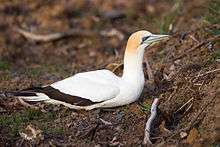Definify.com
Webster 1913 Edition
Morus
‖
Mo′rus
,Noun.
[L., mulberry tree. See
Mulberry
.] (Bot.)
A genus of trees, some species of which produce edible fruit; the mulberry. See
Mulberry
. ☞
Morus alba
is the white mulberry, a native of India or China, the leaves of which are extensively used for feeding silkworms, for which it furnishes the chief food. – Morus multicaulis
, the many-stemmed or Chinese mulberry, is only a form of white mulberry, preferred on account of its more abundant leaves. – Morus nigra
, the black mulberry, produces a dark-colored fruit, of an agreeable flavor. Definition 2026
Morus
Morus
Translingual
Proper noun
Morus m
Hypernyms
- (gannet): Aves - class, Carinatae - subclass, Neornithes - infraclass, Neognathae - parvclass, Pelecaniformes - order, Sulidae - family
Hyponyms
- (gannet): Morus bassanus, Morus capensis, Morus serrator - species
References
- Gill, F. and Wright, M. (2006) Birds of the World: Recommended English Names, Princeton University Press, ISBN 978-0691128276
Etymology 2
From Latin morus (“mulberry tree”)
Proper noun
Morus f
- A taxonomic genus within the family Moraceae – the mulberries.
Hypernyms
- (mulberry): Plantae - kingdom; angiosperms, eudicots, core eudicots, rosids, eurosids I - clades; Rosales - order; Moraceae - family; Moreae - tribe
Hyponyms
- (mulberry): See
 Morus (Moraceae) on Wikispecies.Wikispecies for species
Morus (Moraceae) on Wikispecies.Wikispecies for species
morus
morus
Latin
Noun
mōrus f (genitive mōrī); second declension
- the black mulberry tree
Inflection
Second declension.
| Case | Singular | Plural |
|---|---|---|
| nominative | mōrus | mōrī |
| genitive | mōrī | mōrōrum |
| dative | mōrō | mōrīs |
| accusative | mōrum | mōrōs |
| ablative | mōrō | mōrīs |
| vocative | mōre | mōrī |
Derived terms
- mōrulus
Descendants
References
- morus in Charlton T. Lewis and Charles Short (1879) A Latin Dictionary, Oxford: Clarendon Press
- morus in Charlton T. Lewis (1891) An Elementary Latin Dictionary, New York: Harper & Brothers
- MORUS in Charles du Fresne du Cange’s Glossarium Mediæ et Infimæ Latinitatis (augmented edition, 1883–1887)
- Félix Gaffiot (1934), “morus”, in Dictionnaire Illustré Latin-Français, Paris: Hachette.
- Meissner, Carl; Auden, Henry William (1894) Latin Phrase-Book, London: Macmillan and Co.
-
(ambiguous) to die at a good old age: exacta aetate mori
-
(ambiguous) to starve oneself to death: inediā mori or vitam finire
-
(ambiguous) to die a natural death: necessaria (opp. voluntaria) morte mori
-
(ambiguous) to die of wounds: ex vulnere mori (Fam. 10. 33)
-
(ambiguous) to die at a good old age: exacta aetate mori
